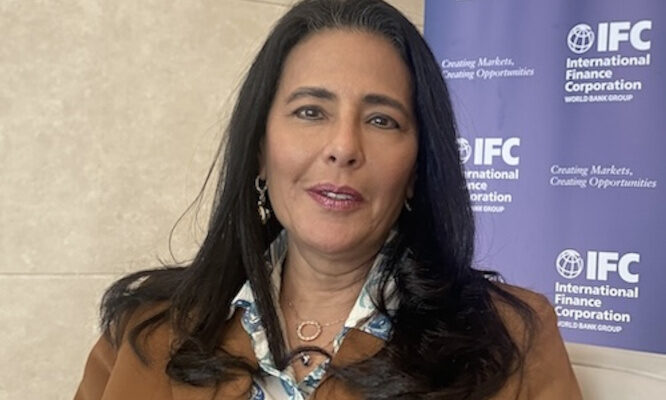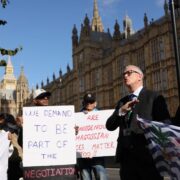
(Ecofin Agency) – In this interview, Dahlia Khalifa, IFC Regional Director for Anglophone West Africa and Central Africa, highlights the institution’s strong expansion across Africa. She emphasizes strategic priorities, ranging from SME financing to economic diversification. Khalifa underscores IFC’s dynamic approach to addressing macroeconomic challenges, particularly in the Congo, while also spotlighting the institution’s extended presence across 40 African nations and its unwavering commitment to fostering private sector growth.
Ecofin Agency: What are the current priorities of IFC for Central Africa and the English-speaking countries of West Africa?
Dahlia Khalifa : Thank you for the opportunity to share what we’re doing in Central Africa and Anglophone West Africa, and to emphasize that our priorities align with those set by governments across the region, where we identify the greatest opportunities. This sub-region is rich in natural resources, from the youth, who are full of aspirations and entrepreneurial ideas, to the vast resources that can be connected to the global market to create more economic opportunities for the people of Central Africa and Anglophone West Africa. I’m very happy to be here in Brazzaville this week, having discussions with policymakers and leaders from the private sector in the country.
Ecofin Agency: Access to financing remains a major challenge for the private sector in these countries, as in many African countries. What lessons can IFC share from his experience in financing the private sector in this Région?
Dahlia Khalifa : Access to finance is one of the critical elements of creating a vibrant economy. When you look at the large size of the SME sector in most countries of the world, they account for 80 to 90% of job creation. So clearly, if you want to increase jobs in any economy and especially in Africa, you need to support SMEs. Oftentimes, SMEs are within what we call the formal sector or in the informal sector. So the more that you can bring SMEs into the formal sector, the more you can provide greater access to finance. Of course, there are other means as well of providing greater means of access to finance, whether it is through FinTech solutions or disruptive technologies to be able to make sure that you reach the entrepreneurs, you reach the market segments, the underserved market segments, where they are. Everybody has a mobile phone today, and a mobile phone is often the first means of accessing finance, finding your customer base, and finding resources.
“Everybody has a mobile phone today, and a mobile phone is often the first means of accessing finance, finding your customer base, and finding resources.”
So the more we can move forward with technologies, the better we can help SMEs access finance. But that’s just one aspect of what matters to a growing economy. Capacity building, reaching markets where they are— all of these elements are critical to growing access to finance and growing SMEs. One other element is that all businesses, all entrepreneurs, all companies operate within an environment. They operate within an environment of business-enabling services, sometimes in business-inhibiting environments. So working with governments to remove barriers to private sector growth is also critical for SMEs to grow.
Ecofin Agency: The economic challenges in Nigeria and in Ghana are putting significant pressure on the private sector, which is facing persistently high inflation. Can we expect increases in IFC support for private business in these countries?
Dahlia Khalifa : IFC has grown its business in Africa over the past 10 years several folds. Where we were 10 years ago is just a small percentage of where we are today, not only in terms of financing but also in terms of capacity building and advisory services through which we engage with the private sector. We have committed a large amount of stock. We are now operating with offices established in 40 countries in Africa. So clearly, IFC is here to stay and is a partner to all the countries of Africa, to all sectors of business across Africa. We are not inhibited by the macroeconomic environment.
“So clearly, IFC is here to stay and is a partner to all the countries of Africa, to all sectors of business across Africa. We are not inhibited by the macroeconomic environment.”
In fact, it is the macroeconomic environment that drives us to double our efforts to make sure that we can help economies overcome the challenges they face from the macroeconomic side. A growing private sector and job creation are the primary ways that economies can overcome these challenges, and that is what IFC is all about.
Ecofin Agency: In the CEMAC region, including Congo, there have recently been some fragilities in the banking sector due to the high concentration of government securities in their portfolio. strengthening his presence alongside private business that may need support. In this regard what can the private sector of this region expect from IFC?
Dahlia Khalifa : IFC is always working with the private sector through all of these challenges. As we mentioned before, there are macroeconomic challenges, there are development challenges, and the private sector is one angle of the solution. The public sector and government play an important role as well. And there are not enough resources for us to say that we can only focus on one aspect of those operating in a country. Everyone needs to work together in order to achieve and bring all the resources that are needed across different sectors. In Congo in particular, one of the key strategies of the government is diversification. Diversification of the economy means looking at how you can support the real sectors, how you can support and grow the agricultural sector. That is really what we’ve seen as a strategy articulated by the government here, and the policies being put forward are in support of that. And that was probably one of the key takeaways from our time here in Brazzaville yesterday during IFC day, where we had government officials and private sector representatives in the room discussing how, together, they could remove the barriers to private sector growth to enable greater diversification of the economy.
Interview conducted by Aboudi Ottou











Comments